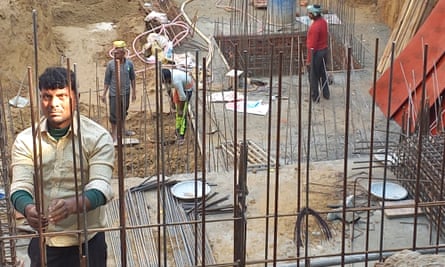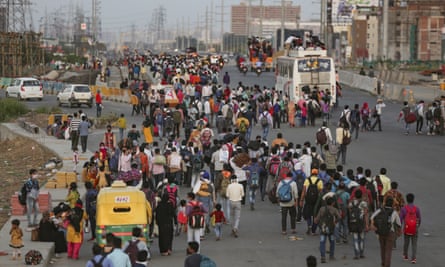[ad_1]
When Ram Yadav fled India’s strict countrywide lockdown imposed in March 2020, he was one of many fortunate ones, managing to hitch rides from Delhi on vehicles going within the route of his village close to Kanpur, 400km (250 miles) away.
An estimated 10 million employees had been forced to walk home, travelling on foot by way of fields, forests and highways within the scorching solar.
The day Yadav, 34, a building employee, reached his village, he vowed by no means to return to the town. “I felt betrayed twice: by society, because no one around me lent a hand – my landlord kicked me out – and by the state. I trusted [the prime minister Narendra] Modi to help me in a once-in-a-lifetime crisis,” he says.
But when he failed to search out any work in his village, he had no selection however to return to the town, solely to search out himself in a fair worse scenario than earlier than. Like tens of millions of others, he’s poorer, hungrier and feels extra deserted than ever within the wake of the pandemic.
An estimated 400 million individuals work in India’s casual sector, on low day by day wages and with no contract, pension, paid holidays or well being advantages. The overwhelming majority will not be unionised as they’re migrant labourers, scattered everywhere in the nation, who converse totally different languages.

The labour economist KR Shyam Sundar says pay and dealing hours have worsened. “This is partly because employers are taking advantage of their desperation – workers will starve if they don’t work – and partly because the Indian economy has yet to recover from the losses of the pandemic, so jobs are very scarce and employers are looking to cut whatever they can,” says Sundar.
Yadav can vouch for the truth that wages are decrease. Scrolling on his telephone throughout a quick break at a building web site in Okhla, the suburban village south-east of Delhi the place he works as a bricklayer, he says he’s paid 450 rupees (£4.60) a day as a substitute of the 600 rupees he earned earlier than lockdown.
“Loads of us were in the queue for my job. The contractor said if I didn’t want 450 rupees, then others would be happy to take it,” says Yadav.
Across the nation, an enormous military of wage hunters is trying to find chronically scarce jobs. Unemployment has risen to virtually 8%, in keeping with the Centre for Monitoring the Indian Economy.
On 15 August, Modi gave a rousing speech to mark 75 years of independence. “I have been able to understand your happiness and sorrows,” he declared from the ramparts of the Red Fort in Delhi. “I could sense your soul calling about the hopes and aspirations you have. With whatever I could embrace of your dreams, I immersed myself fully in empowering those countrymen who were left behind and deprived from being a part of the mainstream.”
Yadav, who has watched the televised independence speech yearly since he was a young person, ignored it and went to go to a relative as a substitute. “I’ve realised it’s just words. Modi imposed the lockdown without even making sure that I had a roof over my head and something to eat. Why should I listen to his speeches?” he asks.
Chandan Kumar, coordinator for the Working People’s Coalition, in Mumbai, says migrant employees are powerless within the face of exploitation.

“Migrant workers cannot defend themselves. When they go to another state, they don’t even speak the local language. No one inspects the premises to check working conditions are safe. They don’t even feature in the records of the local state government. They are invisible,” he says.
The lack of bargaining energy has made life tougher for Varun Sharma, 16, one of many numerous younger males who ship groceries by bike within the capital. He went dwelling throughout the devastating second wave of Covid in March 2021 as a result of, though the store he labored for remained open, his household had been scared for him. He returned final December.
“When I came back, uncle [his employer] paid me the same wage, but I have to work till 9pm instead of 7pm. I have to send money to my family in Bihar so that they can eat, so I had to accept the terms,” says Sharma.
Sundar has noticed three adjustments in employees’ behaviour and hopes. One is that migrant employees have been so scarred by their expertise of being deserted by the state of their time of want that it determines their determination on the place to work.
“Many now refuse to go to a city where they don’t know anybody, even if the wages are acceptable. Social capital is what matters now. They prefer to go where they have a relative or know someone. That’s the psychological impact of the lockdowns. There is more fear than before,’ says Sundar.
The second is that workers are so desperate they are settling for wages they used to reject.
“Pre-pandemic, workers would not work for less than the ‘reservation wage’ [an economic term meaning the lowest wage rate a worker is willing to accept] but now they are prepared to accept it,” says Sundar.
The third consequence is the lack of alternative, he says. Informal employees used to dream about shifting as much as work within the formal financial system, the place they’d safe a salaried job with social safety, paid holidays and well being advantages.
“That dream is now beyond their grasp. Not only are there no jobs, the lucky few to be permanent workers are holding on to their jobs for dear life, leaving no scope for daily wage earners to move up,” he says.
[adinserter block=”4″]
[ad_2]
Source link